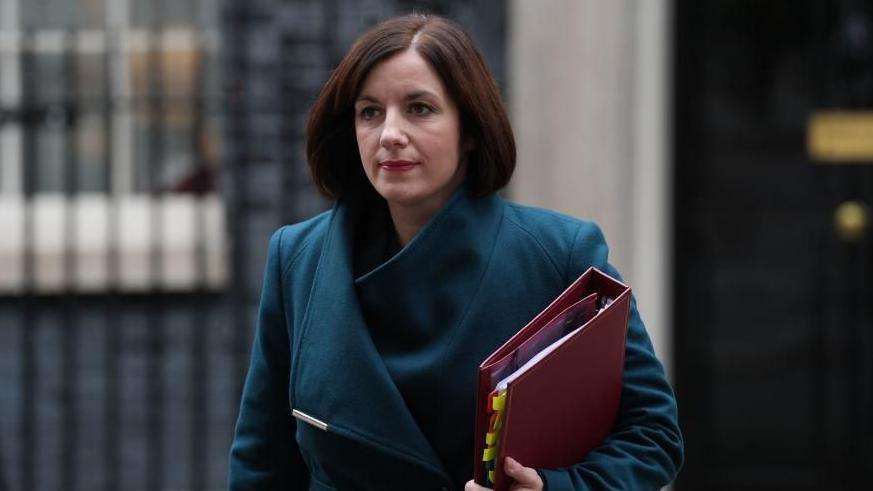Bid to halt children's bill sickening, says Phillipson

Bridget Phillipson criticised the Conservatives' plan
- Published
Pushing for a new national inquiry into grooming gangs by halting the progress of a bill aimed at bolstering child safety is "utterly sickening", the education secretary has said.
Bridget Phillipson told the BBC the Tory Party's amendment to the Children's Wellbeing and Schools Bill "would kill it stone dead" - but the amendment is unlikely to pass in the Commons.
The Conservatives have joined calls by Elon Musk for a new UK-wide inquiry into child sexual abuse, despite a seven-year independent review having concluded its work in 2022.
The wide-ranging bill being debated on Wednesday includes measures to protect vulnerable children, such as tougher rules around home-schooling and support for those in care, inspections of schools, changes to academies, and regulation of private education institutions.
The Conservatives are bringing forward an amendment to the bill to call for ministers to establish a national statutory inquiry into historical child sexual exploitation, focused on grooming gangs.
Ministers have said they want to roll out the recommendations of the previous child sexual abuse inquiry led by Prof Alexis Jay, rather than open a new national one. Prof Alexis Jay told the BBC on Tuesday that victims want action and do not need a new national inquiry.
Phillipson told BBC Radio 4's Today programme the children's bill was "the single biggest piece of children safeguarding legislation in a generation", which the Conservatives intended to block "on the altar of political opportunism".
While the proposed amendment would stop the children's bill in its tracks if it were passed, it will not pass because of the Labour government's large majority. The Conservatives know this, opening themselves up to criticism that their actions are performative.
Yet, if in the coming years they were only to attempt amendments which are likely to pass then they are in for a very quiet period in opposition.
Ultimately, this is what oppositions do: they draw attention to differences in position between them and the government.
The Conservatives are already vowing to continue to amend the bill at every opportunity if - or when - Wednesday's gambit fails, meaning this issue is likely to crop up again before long.
Phillipson said the government backed local inquiries into grooming gangs and said the row over calls for a new national inquiry had "lost sight" of victims.
Asked how many local inquiries could be funded by the government, Phillipson said it had to be led by the evidence and ministers would look at any request.
Shadow justice secretary Robert Jenrick has called for a new national inquiry into grooming gangs and said "what we've learnt more recently is the sheer scale of what is happening".
He told the BBC on Tuesday that the Jay Review looked at six towns but claimed at least 50 towns were suspected to have had grooming gangs.
However Phillipson criticised Jenrick, saying he should "hang his head in shame" for his "failure to bring justice for victims" as a Home Office minister in the previous Conservative government.
She said if Tory MPs plan to vote against the children's bill on Wednesday, they need to explain why they are seeking to block measures that will keep youngsters safe.
"They are a bunch of bandwagon jumpers who have absolutely no shame," she said.
Sir Keir Starmer has also warned Conservative MPs not to back the Commons push for an amendment to the bill, telling the Daily Mirror, external it was a "shocking tactic".
The Liberal Democrats said the party would be putting forward its own amendment to the bill, calling for the recommendations of the Jay Review to be implemented in full.
Robert Jenrick questioned on grooming gangs record
What's in the children's bill?
The measures in the Children's Wellbeing and Schools Bill include:
All councils being required to hold a register of children who are not in school
A unique number for every child, in the same way every adult has their own national insurance number
Parents no longer having an automatic right to take their children out of school for home education if the young person is subject to a child protection investigation or suspected of being at risk of significant harm
Local authorities having the power to intervene and require school attendance if any child's home environment is assessed as unsuitable or unsafe
All teachers will be part of the same core pay and conditions framework whether they work in a local authority-run school or an academy
Tens of thousands of teachers who work in academies that exceed the national pay scales could have their benefits and remuneration put at risk by the new law when it comes into effect, the Tories have claimed.
Academies – which are independent of local authorities – currently have the freedom to set their own pay and conditions for staff, and some academies exceed the national pay scales for teachers.
Shadow education secretary Laura Trott accused Labour of "educational vandalism" over concerns that academies will lose freedoms that can help to recruit teachers and improve pupil outcomes in challenging areas.
However the Department for Education said no teacher will have their pay cut and the bill would give all children access to "expert teachers".